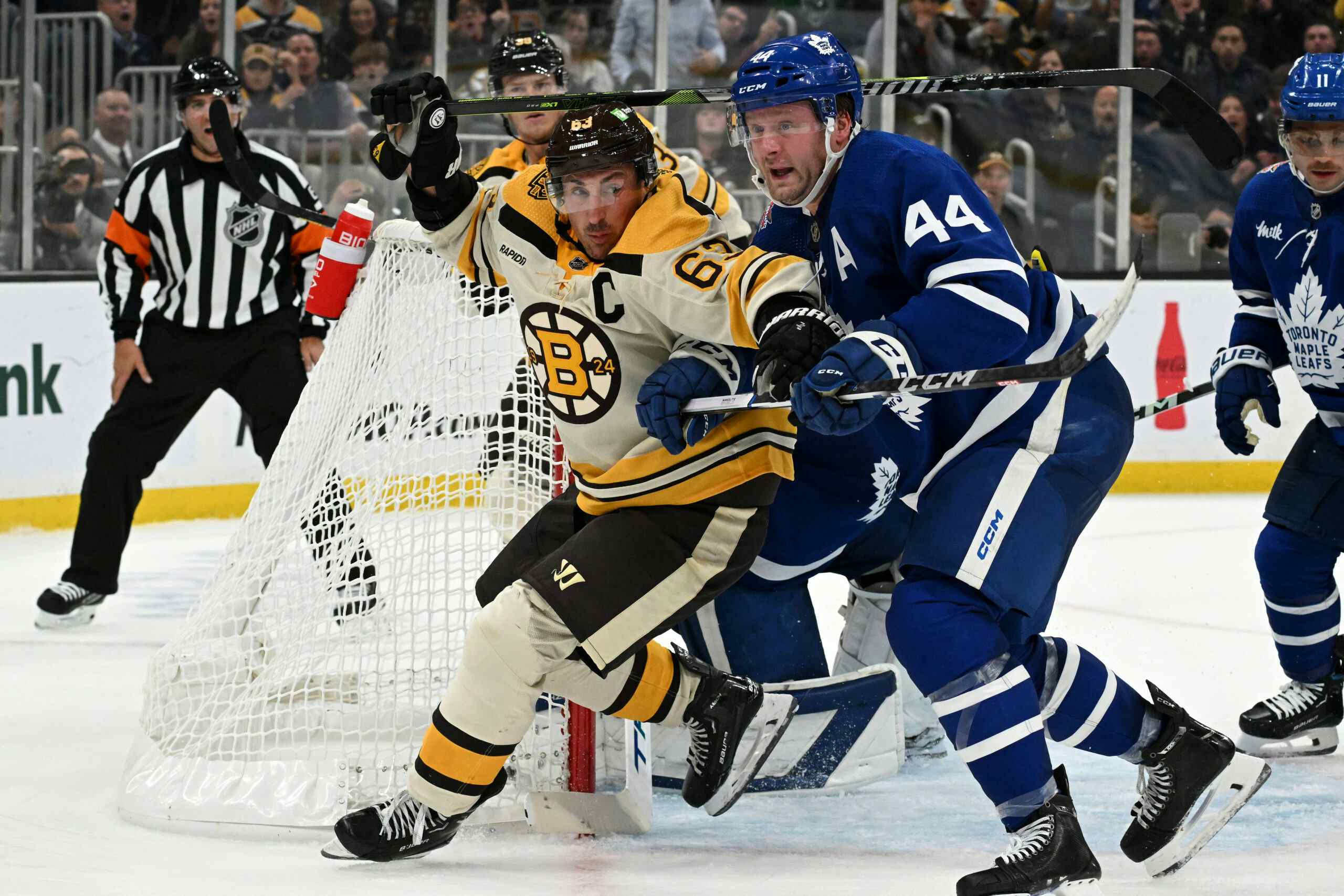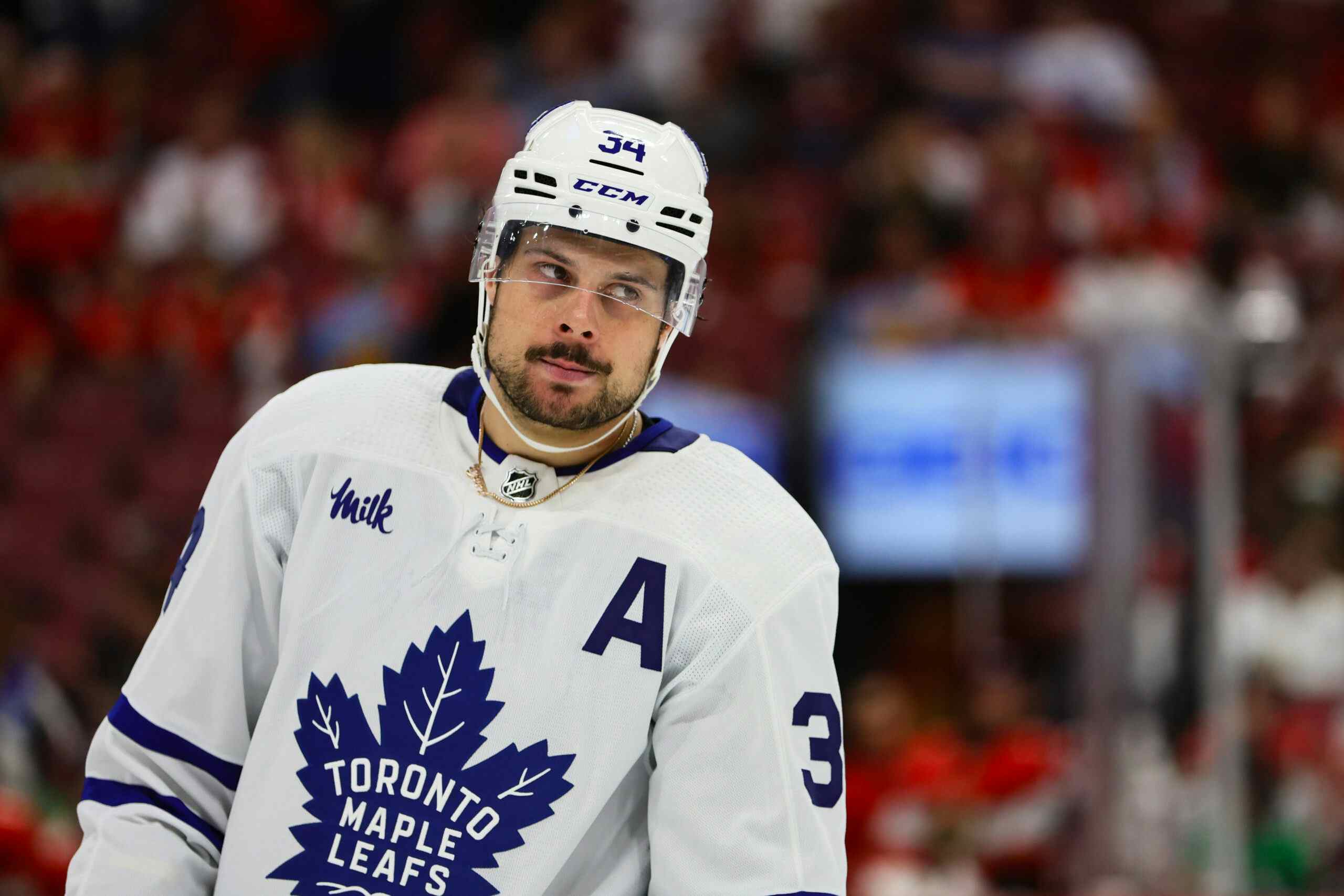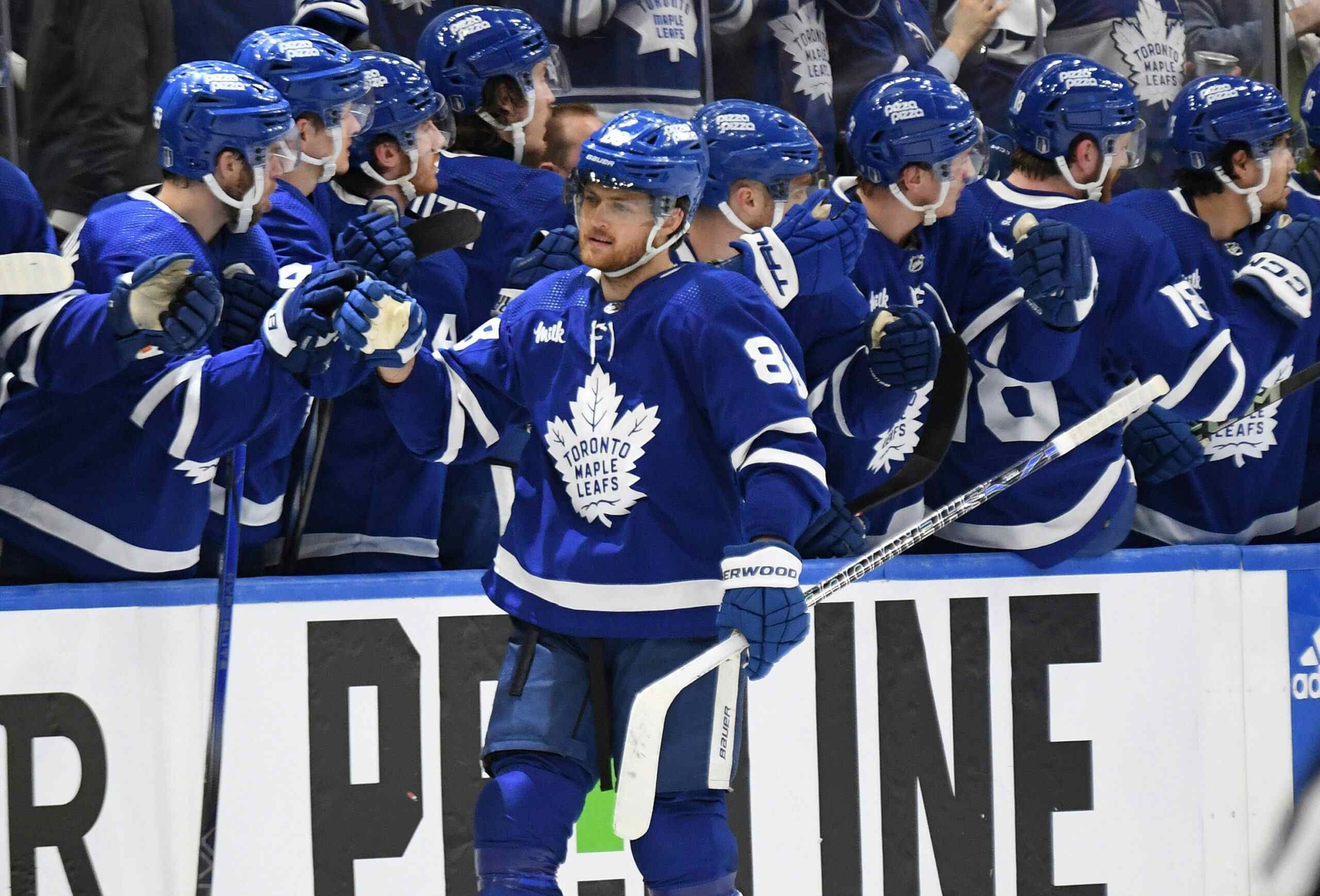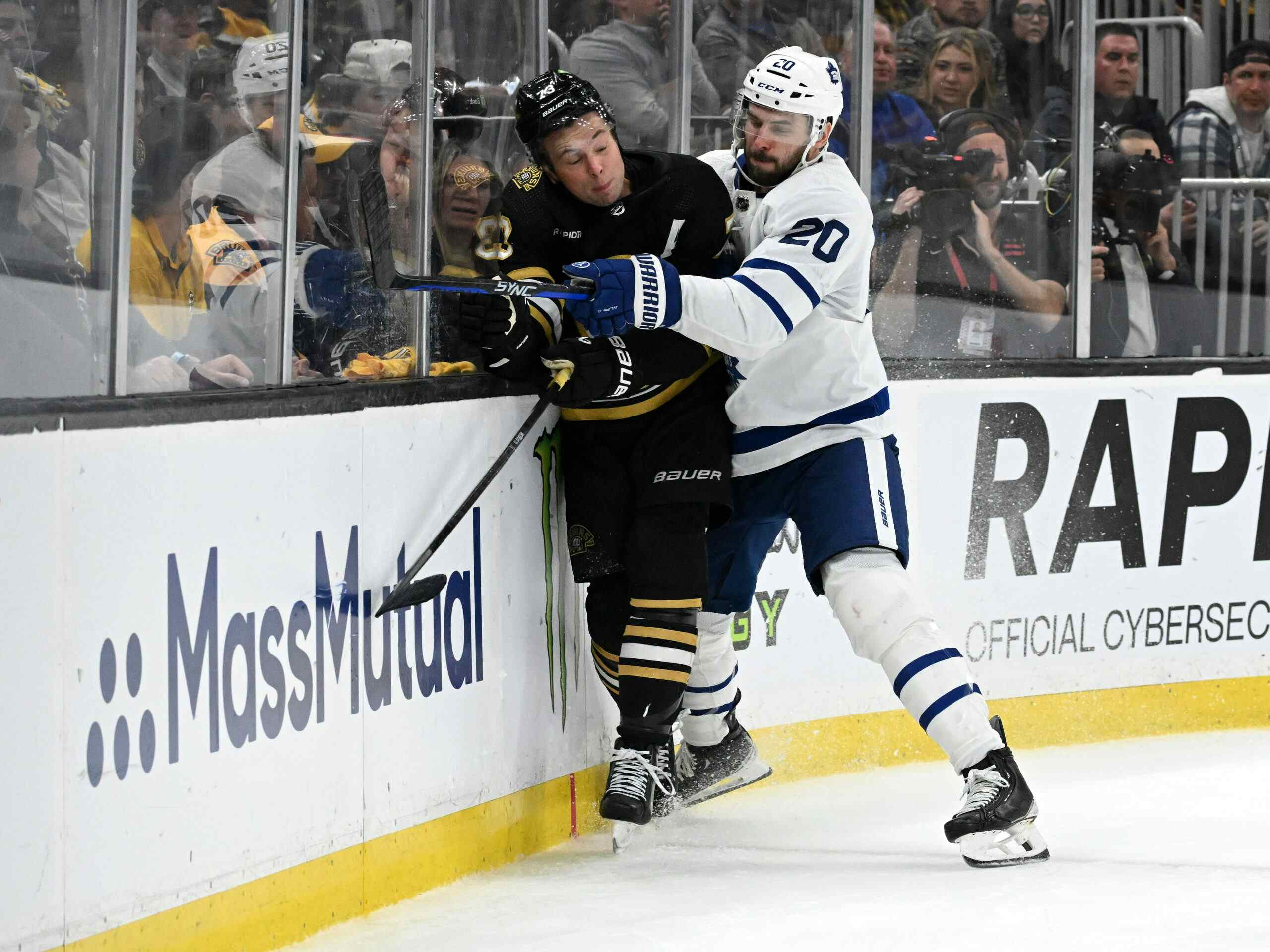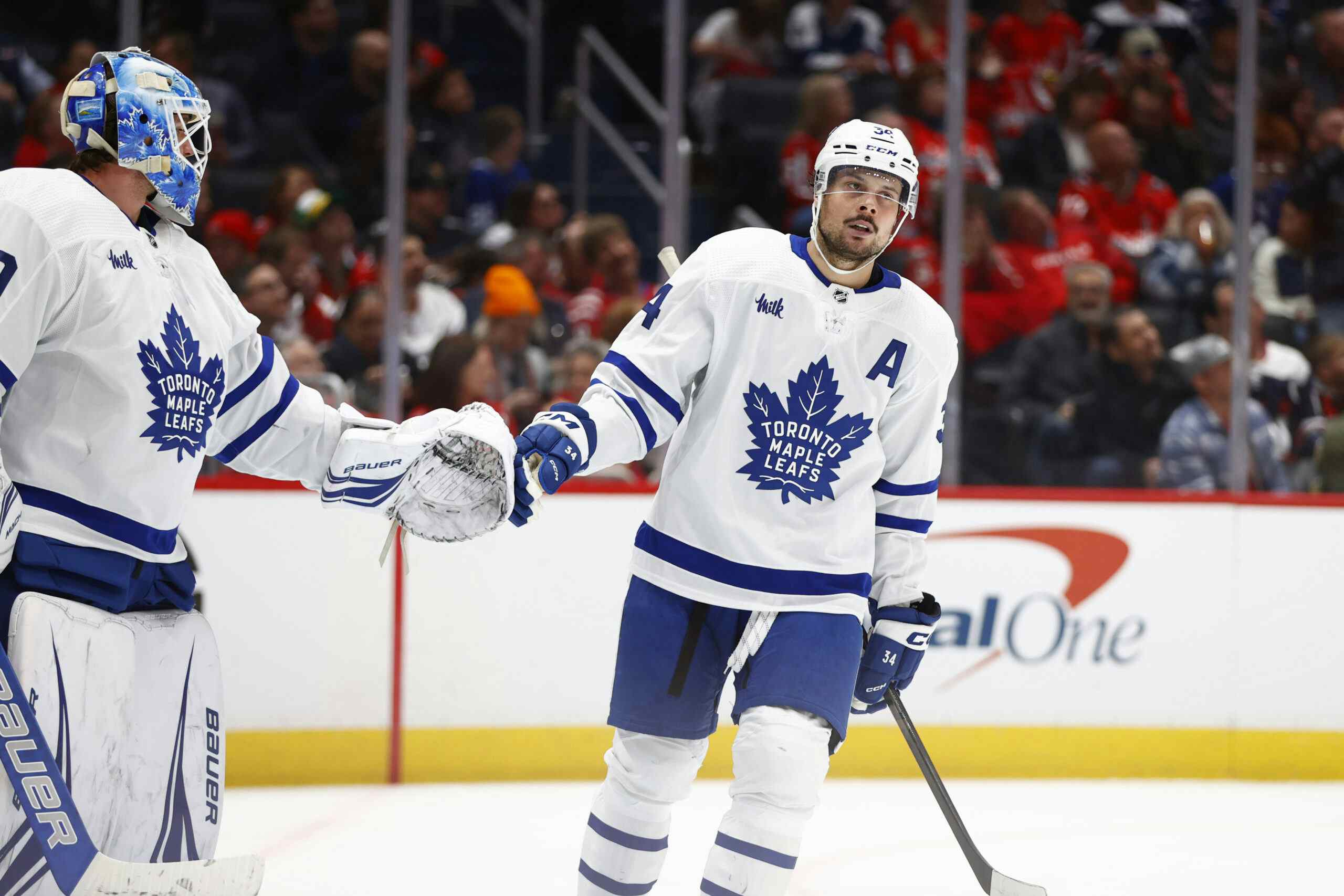Exclusive: Colin Greening on his career, Kyle Dubas, the Marlies as the NHL’s 33rd team, and more
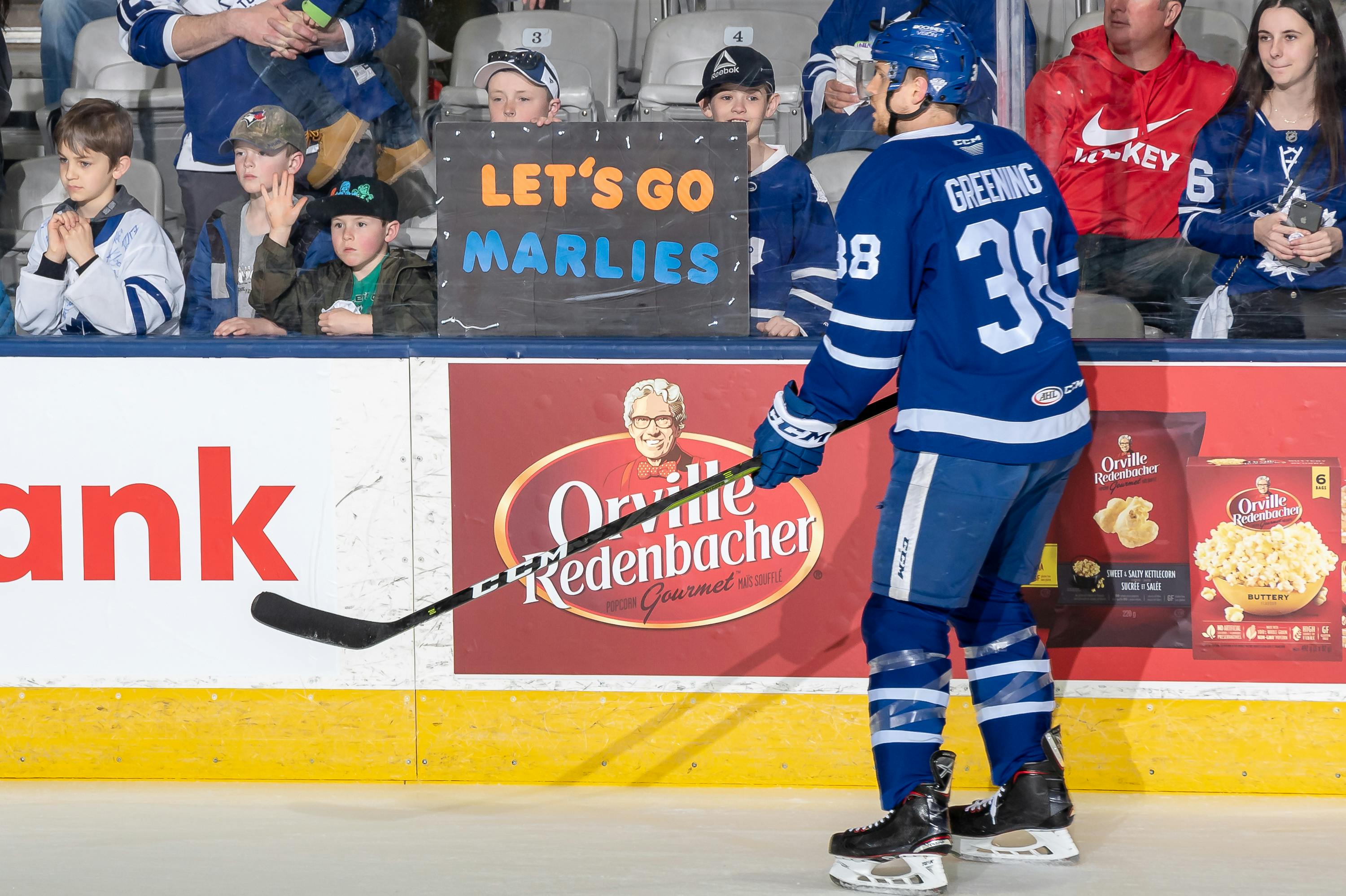
Over the course of what would turn out to be his final three AHL seasons, Colin Greening left a mark — both literally and figuratively — inside the Toronto Marlies’ dressing room.
It was on the night of June 14th, 2018, when the Marlies defeated the Texas Stars in Game 7 of the Calder Cup Finals on home ice, that Greening made an actual physical dent in the locker room. Greening, with the hardware in hand, was one of the last to leave the on-ice celebration and head into the Marlies’ beer-soaked celebration.
When Greening approached the Marlies’ rowdy dressing room, everybody took notice.
“It just got silent for one second because the trophy was coming in the room and everyone wanted to take a look,” Adam Brooks, then a rookie for the Marlies, told The Leafs Nation.
Once the 6’2, 200lb hulking forward came face-to-face with his teammates, he just couldn’t contain his excitement.
“Colin just jumped and lifted it as high as he could and put a hole right through the roof,” Brooks recounted, with a chuckle.
Obviously, that hole in the wall would be patched up quite quickly. However, Greening’s decision to retire this summer leaves an irreplaceable void inside the Marlies’ dressing room. That’s because people like Colin Greening are a rarity at the AHL level, which, according to one trusted AHL source, explains why the Leafs were cutting Greening some of the league’s most lucrative (AHL one-way) cheques over the last couple of seasons.
To the naked eye, though, Greening wasn’t anything too special during his Marlies tenure (accumulating 0.33 points per game throughout 203 games).
But while Greening didn’t lead by example on the scoresheet, he indeed led the charge in facets of the game that can’t be seen by the naked eye, yet carry significant weight, especially for the maturation of a prospect. The intangibles.
Greening was a master in honing his craft with an attention to detail on all the little things–like sleep.
The Cornell graduate is a big advocate for maintaining a healthy sleep regimen, having provided his expertise and experience as a professional athlete to author James Moss, a friend of his, for Moss’ book Sleep to Win (which the Leafs have handed out to prospects at development camp in the past).
“My first road trip in the AHL, he was actually my roommate,” Brooks said.
“I always struggled with sleep and it’s just one of those things that he knew a ton about. You could talk to him about those things— he’s a good insight on other things and he opens up other conversations that maybe you weren’t able to have with other teammates.”
Greening was also looked up to for his desire to learn.
Known to make a concentrated effort to better himself as a person and empower himself with as much knowledge as he could, Greening spent the spare time he had on road trips preparing for life after hockey by studying for his Graduate Management Admission Test (GMAT), a pre-requisite for entering a Masters of Business Administration (MBA) program.
“On the bus, he was always working on schoolwork,” former Marlies defenceman Frank Corrado told The Leafs Nation in a phone call conversation. “It’s just so impressive to see him balance the school and hockey, as well as his wife and daughter.”
After writing the GMAT and finishing up his applications, Greening, armed with a stellar resume that also included a letter of reference from Leafs general manager Kyle Dubas, applied to three schools (Harvard, MIT, Dartmouth), before deciding on one of the worlds most prestigious institutions, Harvard University.
The Leafs Nation caught up with Greening to discuss
TLN: Was there a point where you decided this past season was going to be your last playing professional hockey?
Colin Greening: “I probably knew going into this past season that if things had gone as planned, that this season would, in fact, be my last. The reason I say that is because these plans [of studying an MBA] kind of started, basically, after the 2017 training camp. The Leafs had brought me back on a [AHL one-way] contract and the year prior I played with the Marlies and I thought maybe there was a shot that I might play with the Leafs. It didn’t end up happening that way and so I thought to myself ‘Okay, getting back to the NHL is probably a stretch for me now, but I’m in Toronto. It’s a great city. I have a lot of connections there. My brother lives there. I went to high school there for a few years. So [I thought] this would be a great opportunity for me to really [connect] with a lot of people and learn different industries and perhaps learn about what I’m passionate about.
At the time, I knew I was on the back-nine of my career. So I thought to myself, this would be a great thing to do while I’m still playing and sort of pursue other things outside of hockey. I reached out to a number of people that work in different industries—be it real estate, consulting, finance— I talked to them about what they looked for in an athlete and what advice they would give someone like myself. A lot of the time, what I kept being [told] to me was to get an MBA.”
TLN: How did you go about getting the process of applying to an MBA program, started?
Colin Greening: “On January 1st, 2018, I started studying for the GMAT and talking to people about applications. It basically took me an entire year of grinding away, studying, chatting and soul searching about what I wanted to apply to. And then it was January of 2019 that I finished all my applications and luckily for me, I got three interviews through the whole process. And then I found out that I got into Harvard toward the end of March.”
TLN: Some of your teammates told us that you were known to always be studying on the bus during road trip — did your teammates know exactly what you were doing?
Colin Greening: “They’d see me [studying] and say ‘what are you doing?’ And I was like well I’m studying for a test and they’re looking at some of the stuff, which is like algebra and some thinking games—and they’re like ‘Oh wow, this is crazy.’ I didn’t really talk about my goals I just said I’m thinking about going back to business school, so I have to take this exam first. That’s where I kind of left it.
It was interesting sometimes when you’d come back late at night, at like one in the morning, and I’m trying to keep my eyes open and almost zone out the movie that’s in the background and learn how to do a probability question. Those were some interesting times.”
TLN: When you were sent down to the Marlies, was that the first time you were kind of thrust into a mentorship role at the AHL level?
Colin Greening: “The first time I was sent down was in 2015, for about a month. That was a big shock for myself. The great thing about me was that I had Luke Richardson as a head coach, who was a great support for me. I ended up getting called back up that year, but I didn’t end up playing. It was kind of like a foreshadowing of what was going to come.
The following year, I got sent down right away. I remember my wife and I, at that time, we knew it could potentially happen. We took on the mentality of like, ‘let’s enjoy this and playing is better than not playing’. So we went down to Binghamton, again I had Luke as a head coach, and I think he was a very good catalyst to bring out that leadership in me because he relied on me through that. I remember the first 10 games of the year, he had me as a fourth-line centre with some of the younger guys. He came up to me after those games and was like ‘I appreciate what you did with those guys, they’re really coming along well. Those were the little wins that I was going for.”
TLN: You got quite a lot of little wins throughout your Marlies career, not to mention capturing a championship in 2018. What was it like It to help the Marlies’ young core go all the way?
Colin Greening: “It’s hard to describe. I guess in a simplistic way — yeah, it’s very fulfilling. The real crux of it [though], is why? I think for me it was because of two main reasons. The first was, I won a championship my first year [of professional hockey] and I think was a little naive and almost like thinking this is what [pro hockey] was supposed to be like. As the years go on and you get humbled a little more, you realize it’s extremely, extremely hard to win anything. To win it, especially with the guys that we had, I was a little more mature and I won it as a leader. That meant a lot to me.
The second part of why it was so fulfilling was the fact that when I was initially traded to Toronto, my goal was to just enjoy playing hockey. There was really nothing [in my head] about winning a championship. As the [2017-2018] season went on and we realized how strong of a team we had, that’s when I started to realize — we could win the whole thing. I would say it was almost like my expectations were so different that, when we ended up winning it, I was just like wow this is incredible. For someone like myself whose career was in influx for a number of years, to be a part of a championship team, really meant a lot”
TLN: The Leafs are well-known for their player development program, what were some takeaways you had from being inside the Leafs’ organization and seeing how they develop players?
Colin Greening: “The Leafs are very progressive with the way they look at player development, amongst other things. I believe they’re the only team that has a division of performance and well-being. What that signals to me is that they’re trying to create not only better players but better people as well. So, I think I was a beneficiary of that. I was someone who kind of went through it and I think Kyle was a big catalyst for that. Even in talking with Kyle, he started off in the agency world and I remember him telling me when he used to interview young players, when he was in that role, he would ask them ‘if hockey ended today, what would you do?’ A lot of times, people didn’t really have an answer. It was a question that created thought about defining yourself as more than just a hockey player. I think he applies that mentality with the Leafs. He’s very supportive of your outside life and your family. Kyle wrote my [MBA] recommendation letter, not as almost like a quick sort of thing because I was a mentor and he felt like he had to. I asked him and he might be able to tell you better, but I felt like he wanted to. I felt like it was aligned with his philosophy.”
TLN: In closing, what did you take away from your stint with the Marlies?
Colin Greening: “If it wasn’t for the Leafs organization, I would’ve retired years ago. I think the whole situation in Ottawa through me for a bit of a loop. I wasn’t quite sure if I was going to find a role for myself again. I think I want to thank the Marlies organization for giving me a purpose again and the chance to enjoy playing hockey. That really, ultimately, kept me going for myself. I knew I wanted to pursue other goals and figure out what I wanted to do with my life — but I could have easily done that without playing hockey. But I still enjoyed going to the rink, I still enjoyed being around the guys and I mean for anyone whose not familiar with the organization, before Las Vegas came into [the NHL], we would joke that we were the 31st NHL team. Now, we would say we’re the [33rd] NHL team. It was an organization that treated not only myself, but my family, really really well.
One example [was] when my daughter was born in playoffs. They were flying me in-and-out to see my family because my wife gave birth in Boston and we were in Toronto during the playoffs. I thought that was very classy. A lot of times it was actually Kyle who would suggest it and say ‘Hey I think you should go back tonight, after the game. Tomorrow morning we’ll book a flight for you.’ So I think those are little tiny things that are really important in an organization — it shows they care about the players. Sports is a very cutthroat industry but when you feel like you’re valued as a player and as a person I think that really makes a big difference.”
Recent articles from Jacob Stoller

